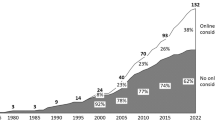Abstract
This article argues that the price obtainable in an open market provides the best standard for determining the justice or injustice of the price of a product. The article argues that this standard, which is closely related to positions which have been held for hundreds of years, is superior to several alternative conceptions of the just price that have been put forward in recent years and is not subject to fundamental criticisms which can be addressed to them. The article also shows how this standard is grounded in more fundamental principles of justice such as desert and equality.
Similar content being viewed by others
Notes
Another statement of Zwolinski in the same article seems to show greater confidence in the notion of fair prices: “[W]hat is clearly morally required in this situation is rescue at a fair price, even if what exactly constitutes a fair price is not itself entirely clear” (Zwolinski 2008: 366). Still, he gives no indication, however general, of what that fair price might be.
I do not discuss in this section Christian Michael’s article in which he defends the thesis that a just price is “one that is agreed upon in the course of a voluntary transaction” (Michel 1999:193). This thesis is sufficiently criticized in Wertheirmer (1996) and Elegido (2009). Ultimately, as Michael Sandel has pointed out, “of any contractual agreement, however free, it is always intelligible and often reasonable to ask the further question, ‘But is it fair, what they have agreed to?’, where this question cannot be translated to the merely vacuous question, ‘But is it what they have agreed to?’ What makes it fair is not just that it was agreed to, but is a further question.” (Sandel 1982: 106). I do not discuss either Walsh and Lynch’s thesis that “[p]ricing is unjust when the profit motive plays an undue role in the all-things-considered determinations of vending agents, when it is overly-determining at the expense of significant other-regarding moral considerations” (Walsh and Lynch 2002: 19). The reason why I do not discuss it is that the issue that interests me in this paper is whether the injustice of the price, considered in itself, can ever be one of those considerations and this is not a topic that they discuss in detail, except for the purpose of criticizing the view they call “market conventionalism.” The criticisms they address to this view (excepting the last one in p. 14 of their article, which is sufficiently addressed in Elegido 2009) are not relevant to an assessment of the open market standard
In the following paragraphs, I focus on my disagreements with Koehn and Wilbratte. My discrepancies with Meng are narrower in scope. I very much like the way in which he relates his thesis on pricing to basic human goods. Where we part ways is not at the level of ultimate principles, but in the application of these principles to the complexities of economic life. In the first place, I would stress that selling or buying at the just price promotes the good of just interaction among members of a community and not just the specific goods (e.g., health or knowledge) that the buyer is trying to foster in buying a specific product. Where the seller sells for what the good is worth (as determined by the criteria I identify below) she cooperates with the buyer for their mutual benefit and that in itself is an intelligible good even if, because of her competing responsibilities, she is not able to help the buyer in promoting better the concrete goods that motivated him to make that purchase. Secondly, while Meng acknowledges the important role of competing responsibilities in identifying our concrete ethical responsibilities, in applying this concept to economic exchanges the only concrete competing responsibility that he identifies is ensuring the survival of the firm. But the concrete responsibilities of the managers of most business firms are much wider than this and require more resources than those sufficient to ensure the survival of the firm.
I do not exclude that on further discussion and investigation it may be established that the standard does not apply to some additional cases. For that matter, I do not exclude either that on further investigation it may turn out that this standard is faulty after all. The point is that I am making a definite claim about the applicability of the standard and that this is obviously preferable to a situation where no claim about that is even made.
It is in fact well known that the laws of many countries make use of precisely this standard without any further epistemological agonies. Many references can be found in Eisenberg (1982).
As opposed to those people who are willing to help coffee growers by paying a premium price for fair trade coffee.
References
Aquinas, T. (1962). Commentary on the Nicomachean ethics (trans: Fortin, E. L., & P. D. O’Neill). In R. Lerner, & M. Mahdi (Eds.), Medieval political philosophy. Ithaca, NY: Cornell University Press.
Aquinas, T. (2006). Summa theologiae. English Province of the Order of Preachers (Eds.). Cambridge: Cambridge University Press.
Aristotle. (1985). Nicomachean ethics (trans: T. Irwin). Indianapolis: Hackett Publishing.
Baumol, W. J., Panzer, J. C., & Willig, R. D. (1982). Contestable markets and the theory of industrial structure. New York, NY: Harcourt Brace Jovanovitch.
Block, W. (2002). A critique of the legal and philosophical case for rent control. Journal of Business Ethics, 40, 75–90.
Boyle, J. M., Grisez, G., & Tollefsen, O. (1976). Free choice: A self-referential argument. Notre Dame and London: University of Notre Dame Press.
Cupit, G. (1996). Desert and responsibility. Canadian Journal of Philosophy, 26, 83–100.
Eisenberg, M. A. (1982). The bargain principle and its limits. Harvard Law Review, 95(4), 741–801.
Elegido, J. M. (2009). The just price: Three insights from the Salamanca School. Journal of Business Ethics, 90, 29–46.
Elegido, J. M. (2011). The ethics of price discrimination. Business Ethics Quarterly, 21(4), 633–660.
Feldman, F. (1995). Desert: Reconsideration of some received wisdom. Mind, 104, 63–77.
Feldman, F. (1996). Responsibility as a condition for desert. Mind, 105, 165–168.
Finnis, J. (1980). Natural law and natural rights. Oxford: University Press.
Finnis, J. (1998). Aquinas: Moral, political and legal theory. Oxford: Oxford University Press.
Frank, R. (1988). Passions within reason. New York: W.W. Norton.
Friedman, H. H. (2001). The impact of Jewish values on marketing and business practices. Journal of Macromarketing, 21, 74–80.
Gordley, J. (1981). Equality in exchange. California Law Review, 69(6), 1587–1656.
Gordley, J. (1991). The philosophical origins of modern contract doctrine. New York: Oxford University Press.
Hayek, F. (1945). The use of knowledge in society. American Economic Review, 35(4), 519–530.
Hill, T. E. (1992). Dignity and practical reason in Kant’s moral theory. Ithaca: Cornell University Press.
Hudon, M., & Ashta, A. (2013). Fairness and microcredit interest rates: From Rawlsian principles of justice to the distribution of the bargaining range. Business Ethics: A European Review, 22(3), 277–291.
Kirzner, I. (1973). Competition and entrepreneurship. Chicago: The University of Chicago Press.
Kirzner, I. (1995). The nature of profits: Some economic insights and their ethical implications. In R. Cowan & M. J. Rizzo (Eds.), Profits and morality (pp. 22–47). Chicago: The University of Chicago Press.
Kleiman, E. (1987). Just price in Talmudic literature. History of Political Economy, 19, 23–45.
Koehn, D., & Wilbratte, B. (2012). A defense of a Thomistic concept of the just price. Business Ethics Quarterly, 22(3), 503–528.
Langholm, O. (1979). Price and value in the Aristotelian tradition: A study in scholastic economic sources. Oslo: Universitets for laget.
Langholm, O. (1992). Economics in the medieval schools. Leiden: E. J. Brill.
Lapidus, A. (1994). Norm, virtue and information: The just price and individual behavior in Thomas Aquinas’ Summa theologiae. European Journal of the History of Economic Thought, 1(3), 435–473.
Lepak, D. P., Smith, K. G., & Taylor, S. M. (2007). Value creation and value capture: A multilevel perspective. Academy of Management Review, 32(1), 180–194.
Lewis, M. (2010). The big short: Inside the doomsday machine. New York: Norton & Company.
Mack, E. (1995). Rights to natural talents and pure profits: A critique of Gauthier on rights and economic rent. In R. Cowan & M. J. Rizzo (Eds.), Profits and morality (pp. 124–149). Chicago: The University of Chicago Press.
Macpherson, C. B. (1985). The rise and fall of economic justice and other papers. New York: Oxford University Press.
Maitland, I. (2002). Priceless goods: How should life-saving drugs be priced? Business Ethics Quarterly, 12, 451–480.
Marcoux, A. M. (2006). Much ado about price discrimination. Journal of Markets and Morality, 9(1), 57–69.
Mayer, R. (2007). What’s wrong with exploitation? Journal of Applied Philosophy, 24(2), 137–150.
Meng, J. C. S. (2005). What profits for a man to gain: Just (the) price (of the soul). Journal of Markets & Morality, 8(1), 7–26.
Michel, C. (1999). What is a just price? Journal of Markets & Morality, 2(2), 182–196.
Miller, D. (1992). Distributive justice: What the people think. Ethics, 102(3), 555–593.
Morgenson, G. (2009). Banks bundled bad debt, bet against it and won. New York Times, December 24, 2009, p A1.
Moriarty, J. (2002). Desert and distributive justice. In A theory of justice. Journal of social philosophy, 33(1), 131–143.
Narveson, J. (1995). Deserving profits. In R. Cowan & M. J. Rizzo (Eds.), Profits and morality (pp. 48–87). Chicago: The University of Chicago Press.
Nozick, R. (1974). Anarchy, state, and utopia. New York: Basic Books.
O’neill, O. (1989). Constructions of reason: Explorations of Kant's practical philosophy. Cambridge: Cambridge University Press.
Perrone, A. (Forthcoming). The just price doctrine and contemporary contract law: Some introductory remarks. Rivista Internazionale di Scienze Sociali.
Rawls, J. (1971). A theory of justice. London: Oxford University Press.
Roover, R. (1958). The concept of the just price: Theory and economic policy. The Journal of Economic History, 18(4), 418–434.
Sandel, M. (1982). Liberalism and the limits of justice. Cambridge: Cambridge University Press.
Schlegelmilch, B. B., & Oberseder, M. (2010). Half a century of marketing ethics: Shifting perspectives and emerging trends. Journal of Business Ethics, 93, 1–19.
Sher, G. (1987). Desert. Princeton: Princeton University Press.
Snyder, J. (2009a). What’s the matter with price gouging? Business Ethics Quarterly, 19(2), 275–293.
Snyder, J. (2009b). Efficiency, equity, and price gouging: A response to Zwolinski. Business Ethics Quarterly, 19(2), 303–306.
Snyder, J. (2010). Exploitation and sweatshop labor: Perspectives and issues. Business Ethics Quarterly, 20, 187–213.
Swygert, M. I., & Yanes, K. E. (1998). A unified theory of justice: The integration of fairness into efficiency. Washington Law Review, 73, 249–283.
Valdman, M. (2009). A theory of wrongful exploitation. Philosophers’ Imprint, 9(6), 1–14.
Walsh, A., & Lynch, T. (2002). The very idea of justice in pricing. Business and Professional Ethics Journal, 21(3/4), 3–25.
Watson, A. (Ed.). (1998). The digest of Justinian. Philadelphia, PA: University of Pennsylvania Press.
Wertheimer, A. (1996). Exploitation. Princeton: Princeton University Press.
Winston, C., & Crandall, R. (2011). First thing we do, let’s deregulate all the lawyers. Washington, DC: Brookings Institution Press.
Zaitchik, A. (1977). On deserving to deserve. Philosophy & Public Affairs, 6, 370–388.
Zwolinski, M. (2008). The ethics of price gouging. Business Ethics Quarterly, 18(3), 347–378.
Zwolinski, M. (2010). Price gouging and market failure. In G. Gaus, J. Lamont, & C. Favor (Eds.), New essays on philosophy, politics and economics: Integration and common research projects. Stanford: Stanford University Press.
Author information
Authors and Affiliations
Corresponding author
Rights and permissions
About this article
Cite this article
Elegido, J.M. The Just Price as the Price Obtainable in an Open Market. J Bus Ethics 130, 557–572 (2015). https://doi.org/10.1007/s10551-014-2240-6
Received:
Accepted:
Published:
Issue Date:
DOI: https://doi.org/10.1007/s10551-014-2240-6




